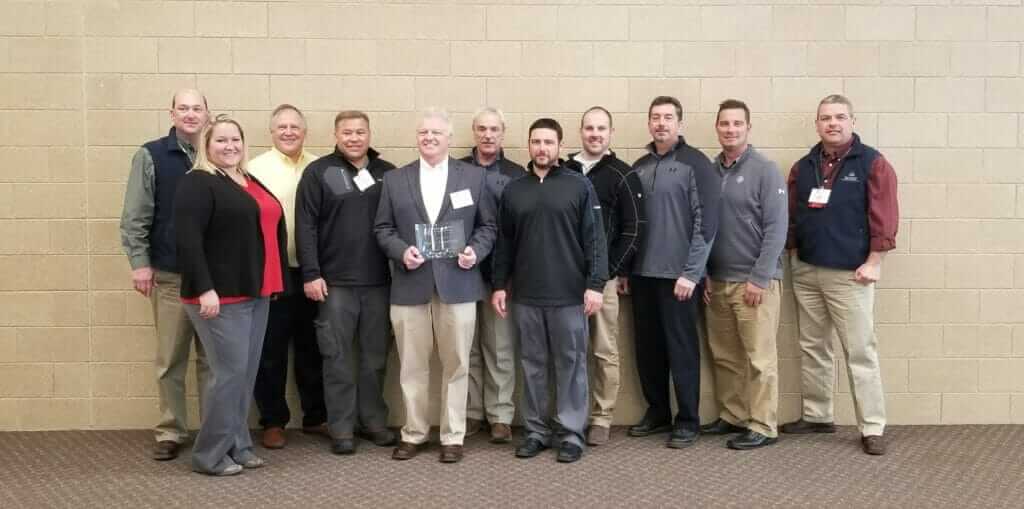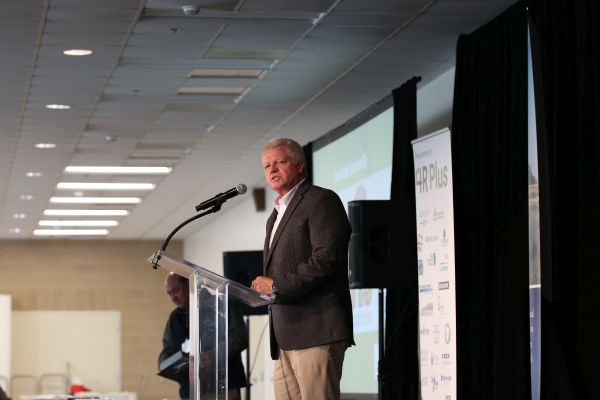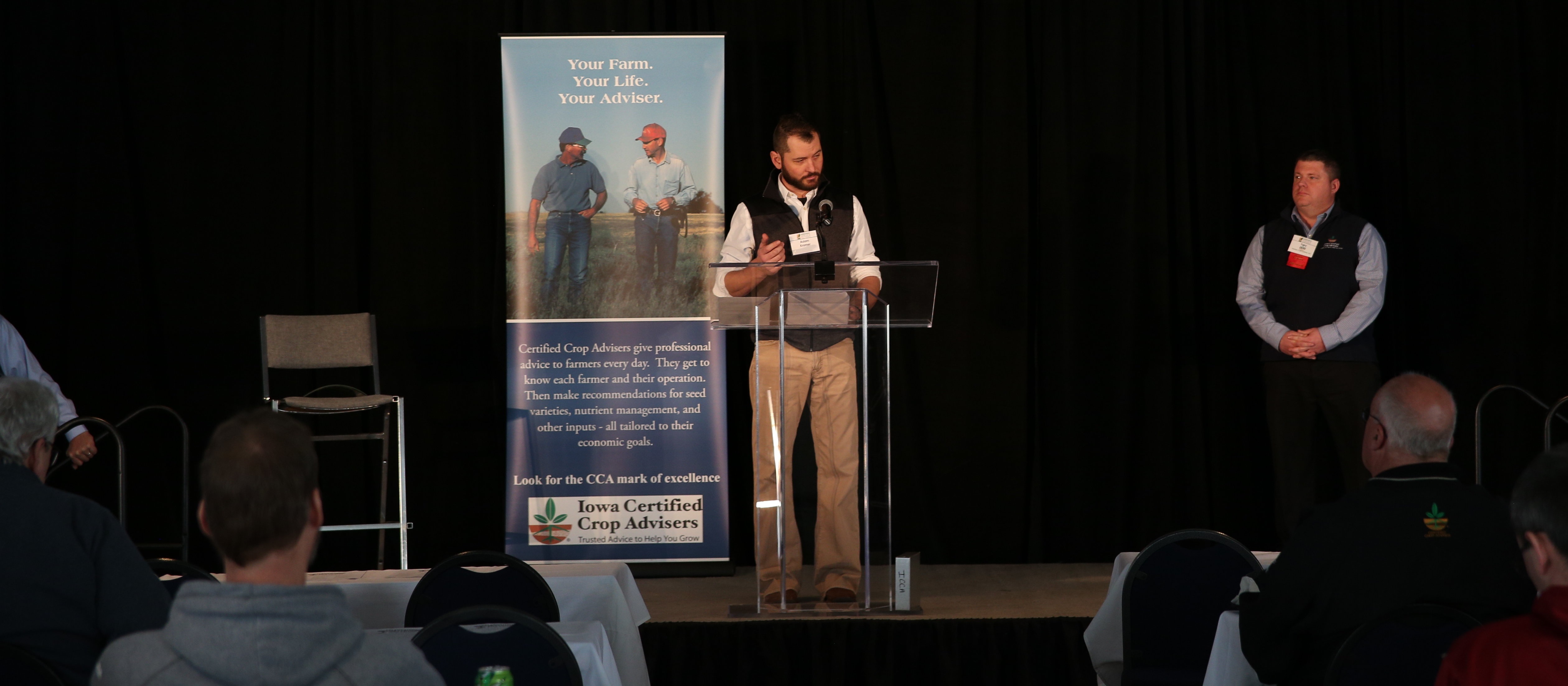Armstrong Awarded 2019 ICCA of the Year Award
Iowa CCA Walter Armstrong Named International CCA of the Year by ASA
By Denice Rackley
Original post from ASA – click to view

Above photo was taken during the 2018 Agribusiness Showcase & Conference Iowa CCA Awards Luncheon on February 13, 2018. Walter was honored with the Iowa CCA of the Year Award in February of 2018 and nominated by the Iowa CCA board to receive the International CCA of the Year Award in March 2019. Walter pictured front row left – the plaque was awarded to Armstrong for his dedication and commitment to what it means to be a CCA.
Education and innovation are the hallmarks of the career of this year’s International Certified Crop Adviser (ICCA) of the Year Award recipient, Walter Armstrong of Ames, IA. For more than three decades, Armstrong has been listening to his customers and helping to solve their problems. Each year, one of the more than 13,000 CCAs is selected to receive this award based on his or her customer service, innovation, leadership skills, knowledge, and ability to exchange ideas and educate those in the agriculture community.
Armstrong grew up on a diversified crop and livestock operation. He graduated from Iowa State University in 1984 with a bachelor’s degree in education emphasizing agriculture. Active in the Iowa CCA program, Armstrong has served as a board member, a marketing committee chair, and as president. While on the board, he sought opportunities to speak with college students about his vocation and the CCA program. Bill Northey, former Iowa Secretary of Agriculture, believes Armstrong’s leadership has fostered greater trust between farmers in the community and their CCAs. Armstrong has worked in the sales, marketing, and management areas of prominent agriculture companies and currently works for Bayer CropScience.
It’s no surprise that an education major enjoys learning and advocates for education. Armstrong believes “the more you know the more you can help,” adamantly supporting the CCA program and the knowledge, skill, and professionalism it represents. The CCA program’s extensive continuing education requirements “encourages you to be more on your toes,” Armstrong comments. Learning and the exchange of ideas takes place not so much in a classroom but in the field assisting his customers. Perceiving a problem and figuring out possible solutions for the customers is what Armstrong enjoys most in his work. Combining experience and knowledge with innovative ideas that solve problems is Armstrong’s passion.
“Walter does not sell products to his customers—he helps customers solve their problems,” says David Nelson, owner/partner of Nelson Farms and Ag Solutions Group. “These solutions come about from Walter’s way of listening, assessing, and communicating with the customer. Walter has been and is an excellent representative of what I believe the Certified Crop Adviser Program strives to portray in its commitment to U.S. agriculture.”
Armstrong tries to understand the challenges his clients face on a day-to-day basis. He has been involved in helping design and market new equipment ideas and devising adaptations of equipment to meet the ever-changing challenges faced by producers. Armstrong, in collaboration with a chemical equipment manufacturer, was the marketing lead that developed spray kits for the conversion of floater spray equipment. This equipment was designed to navigate the rough terrain of CRP acres, spraying glyphosate in preparation for production. This concept minimized soil erosion caused by tillage and encouraged the use of no-till. Along with an equipment manufacturer, Armstrong was involved in the early developmental stages of equipment that would till and level the ground in one pass prior to planting. He also collaborated on a universal injection system that was able to apply an insecticide and fungicide in-furrow. Armstrong was also involved in the concept and design of equipment that saves farmers time by spraying glyphosate while no-till drilling soybeans.
Armstrong became a CCA in 1996 and has been a crop adviser for 34 years. Over the years, he’s seen many changes in agriculture. “In the 1980s, we were growing crops in wide rows, now we use narrower rows. We used to think 140- to 150-bushel corn was good, now we produce 200- to 250-bushels/acre. Bio-technology has played a considerable part in agriculture and will continue to do so into the future. Hybrid seeds and varieties are now specially designed for different soil types and environmental conditions. Everything from fertilizer application to pesticide and weed management has evolved and continues to
do so.”
Looking to the future
Armstrong views agriculture as an increasingly competitive and sophisticated business, “Not only are producers competing for acres but also markets,” he says. He sees CCAs deciphering the vast bombardment of digital information, using their education and skills to sort out what actually works and is practical from the continual stream of information. Armstrong expects the challenges of balancing production with environmental concerns to increase. “Producers need to produce as much as possible while simultaneously dealing with a shortage of individuals in the ag workforce. We will need to continue working toward environmental preservation and address soil and water quality issues.” The role of CCAs will expand with continued advancements in knowledge and digital technologies, Armstrong believes. New technologies will help provide answers, but this will be an evolving process. “CCAs will need to partner with other ag professionals as more pressure is applied to produce the world’s food in a safe, ethical way while preserving the planet,” Armstrong says.
“The advances in digital technology and climate data enable us to overlay information on soil types, fertility, insect pressures, diseases, precipitate, humidity, heat, and other factors affecting production. This will lead to compelling changes for the future of agriculture,” he says. Armstrong believes CCAs are committed to agriculture and desire to see the industry continue to advance.
CCAs along with others in the ag industry must share the responsibility of getting accurate information about agriculture in front of the general public. The perception of agriculture and biotechnology combined with production needs and environmental preservation is where challenges of the future lie, according to Armstrong. “Stepping out of the shadows [and] having an open discussion will benefit everyone.”
Armstrong’s advice for young agriculture professionals is to “jump in, be proactive.” He goes on to say, “if you grasp concepts and are continually learning; if you focus on trying to solve problems and making a difference, you will succeed.”
To learn more about the American Society of Agronomy please visit https://www.agronomy.org/





